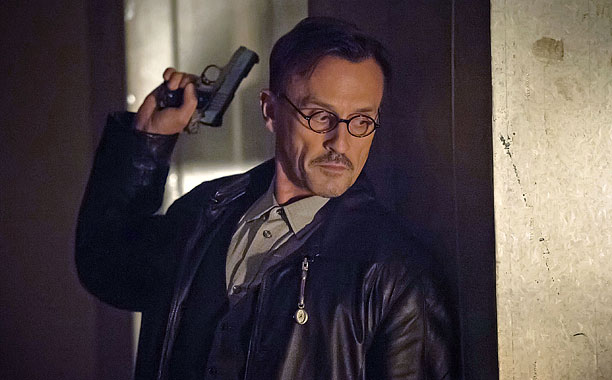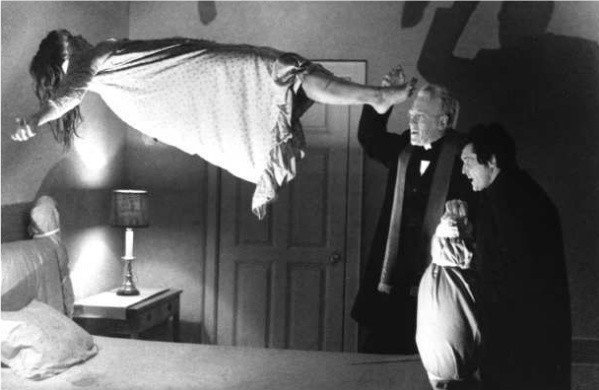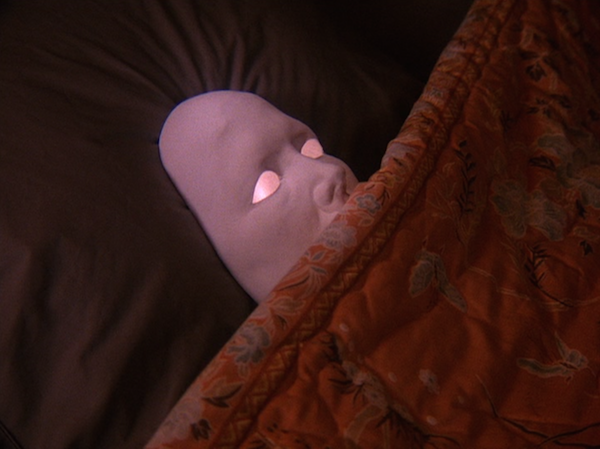Arrow Season 2, Episode 14 “Time of Death”
Written by Wendy Mericle & Beth Schwartz
Directed by Nick Copus
Airs Wednesday nights at 8pm ET on The CW
It’s too bad that “Time of Death” is less about The Clock King than it is about Laurel Lance – given some more screen time, Robert Knepper’s ability to portray self-fulfilling weirdo (remember how awesome he was on Prison Break?) would easily rank among the best of Arrow‘s one-off villains (which is unfortunately, a short list). Instead, “Time of Death” spends a lot of time on Laurel and her emotions, picking up only when The Clock King and his mind games (particularly those aimed at Felicity) came to the forefront.
The Laurel Problem remains the Laurel Problem in “Time of Death” for a simple reason: instead of allowing her explosion at the end of “Heir to the Demon” to catalyze her character into action, “Time of Death” refuses to let her character move, spiraling around the same drugged-up-but-I-have-it-under-control attitude and screaming fits accentuated with scenes of her crying in front of Ollie (or her father, or some other strong male figure – we don’t even see her cry in front of her sister). And those conversations go nowhere: Oliver confronts her and tells her he’s been “chasing her for half her life, and he’s not running anymore”, which has all the emotional impact of a dull fart (seriously: how many will they/won’t they/they are/they might again scenarios can one character have???) – and when Quentin all of a sudden wants to get the family back together (because his wife grabbed his thumb and smiled… one time), it turns into Laurel screaming because her mother moved on two years after getting divorced. In a matter of forty minutes, the promising closing moments of “Heir to the Demon” that finally pushed Laurel’s character in some sort of direction are ripped to shreds: “Time of Death” sees Laurel at her most self-indulgent and pathetic, a sad, annoying shell of what was once a barely-developed character.
And with so much attention paid to Laurel’s insignificant tantrums, more interesting stories (with better characters) are lost; by the time “Time of Death” firmly establishes what is bothering Felicity, she’s throwing herself into a dangerous situation alone, simply because she didn’t want to feel left out of the expanded group (and obviously jealous of the Canary/Arrow sexcapades, as little as she wants to let on). It squashes a story line that was just getting interesting: season two’s seen Felicity’s technical abilities be challenged, similar to Arrow’s battles with Solomon Grundy and the League of Assassins. These are enemies whose skills not only can challenge their own, but surpass them in insurmountable ways: Oliver’s physical disadvantage against Mirakuru-injected people and Felicity’s technological knowlege being bested by Arrow’s enemies are two situations neither of them handle well.
Sure, the episode ends with Oliver and Felicity bonding (“you’ll always be my girl” he tells her, sending a million teenage girls swooning and one awesome superhero tech support woman to a lonely life full of cats) – but what happened to Felicity’s feelings for Barry? Why does the presence of Sarah have to put Oliver at the center, not just focus on the dynamic between the two female characters? The simple answer is love: and whenever Arrow gets into the matters of the heart (*cough* Laurel), it struggles mightily to transcend mediocrity.
And all of this comes at the expense of The Clock King, a supremely entertaining character (“Timing is everything”, he warns his accomplices while robbing a bank in the opening sequence) with extremely trite motivations (basically ‘I’m doing this because I’m terminal and so is a close family member who needs treatment!’). Again, interesting ideas given no room for intricate execution: The Clock King gets reduced to the simplest type of villain, able to outsmart Felicity for the entire episode until she explodes his cell phone, seemingly on a whim (maybe don’t carry it on you after you showed them how to fry a bunch of computer equipment?). We don’t get any back story on him or his relationship with the sick family member – he’s just some cool lines, flashy and effective camera work, and then boom: thwarted right in time for the emotional reconciliations (“When you ‘died’ I made it all about me!!!” Laurel tells her sister, and they hug) and a killer ending, bringing Slade Wilson right into the home of the Queen family. If anything, “Time of Death” gives us that: a bridge to the next episode, hopefully one where Laurel finally gets hit by a b… I mean, figures out a way to kick ass and become a functional, three-dimensional part of Arrow again.
— Randy






